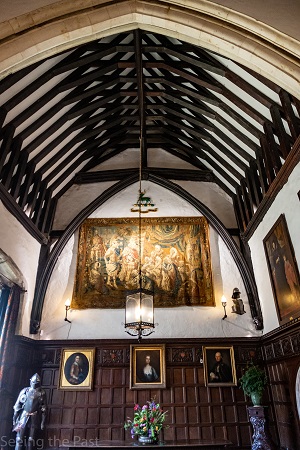Now in its twelfth year, the Music@Malling Festival presents concerts and events in historic venues in and around West Malling in Kent, and the Marian Consort invited us to the Great Hall of Ightham Mote, a fourteenth-century moated manor house in the Kent countryside, for a programme of music written in England during the Tudor period.
During this time, the house was owned by the Haute family, a prominent and influential Kent family who appear in county records as Sheriffs, Justices of the Peace and Members of Parliament. They were related by marriage to Queen Elizabeth Woodville, the wife of Edward IV, and in an engaging pre-concert talk, Magnus Williamson, Professor of Early Music at Newcastle University, explained that Ightham Mote can serve as a window to the political upheavals of the Wars of the Roses, and to the establishment of English hall and court traditions.
When Sir Nicholas Haute died c.1415/16, his eldest son William inherited the family estates, including Ightham Mote. The latter’s eldest son, Sir William Haute (c.1440-97) was described in the programme as ‘the only known amateur composer in England before Henry VIII’, and two of his three extant compositions – one of two settings of the ‘Benedicamus Domino’, which was later acquired by Samuel Pepys, and a Marian antiphon, Stella Caeli – added pleasing ‘local interest’ to the programme, being performed for the first time in over 500 years in the Hall where they had probably been first heard.

The Marian Consort’s Artistic Director, Rory McCleery, offered the large audience huddled in the Great Hall a genial introduction to each item, establishing its context within the musical life of the period – ecclesiastical, courtly, commercial and familial. The works – all drawn from the Baldwin, Dow and Sadler collections – were performed as secular ‘chamber’ pieces, though, rather than as liturgical works. This seemed fitting as earlier Williamson had explained that the scribe of the Benedicamus by Haute which had been owned by Pepys was also responsible for a household management book, suggesting that the music may have been performed in a secular context.
Singing one-voice-to-a-part, the five-strong (SAATB) Consort consistently paced the music to make it speak clearly, the clarity of the part-writing aided by the small forces, and they worked hard to attain the sort of blending more readily achieved by a larger ensemble – and in this regard, the soft edge of Victoria Meteyard’s soprano was helpful. In the fairly small Hall, there was no sense of the sound lacking in fullness, though there were initially some challenges of intonation to be overcome. And, the Consort didn’t make it easy for themselves by opening their programme with Thomas Tallis’s ‘Lamentations of Jeremiah’, which is notable for its harmonic subtleties and contrapuntal complexity. I felt that the ensemble might have let the sections of the work ‘settle’ more, taking more time as they turned the corners, which in turn would have highlighted the imitative points more purposefully.
In ‘Tibi soli peccavi’ by Nathaniel Giles, who sang alongside John Baldwin in the Chapel Royal, the phrases did acquire both breadth and flow, however, and in the sole English-texted work, William Byrd’s ‘Why Do I use my paper, ink and pen?’ from the Psalmes, Sonets, & Songs of 1588, the imitative entries were nicely pointed, anchored by Humphrey Thompson’s very secure bass. The vocal lines were agile, giving urgency to the text – a poem, attributed to Henry Walpole, on the execution of Edmund Campion in 1581, an event which led Walpole to reconcile with the Catholic Church and travel to Rome to begin studies for ordination. When Stephen Vallenger attempted to publish the entire poem in 1582, he was imprisoned, tortured and executed, and this performance captured something of the tension inherent in Byrd’s courageous setting.

Byrd’s ‘Domine praestolamur’ was similarly fervent, exploiting the double imitation which enhances the pleas to ‘lift the yoke that holds us captive’ and ‘set your people free’, while Robert Parsons’s ‘Ave Maria’ was noble of tone, individual details such as the soprano’s simple repetitions, rising by one note at a time, and propelling scalic rises in the bass, making their mark within the prevailing warm blend. McCleery placed the resolution of the closing cadence most sensitively.
A lack of variety was avoided by the inclusion of items for fewer voices, and these often felt more secure with regard to tuning, and also encouraged more responsive interaction between the singers. Williamson had suggested that Robert Fayrfax may at one time have been employed in the Haute household, and we heard the first section of Fayrfax’s ‘Ave Dei Patris filia’ (for SAT), the sustained lines of which were well-supported and even. John Dunstable’s three-voice (ATB) processional anthem, ‘Quam pulchra es’, also had a lovely cantabile feel, and the alleluia flowered gently.
And what of Sir William Haute’s compositional achievements? The simple counterpoint of the brief ‘Benedicamus Domino’ was beautifully sung by McCleery and alto Sarah Anne Champion, the interplay between the two voices free and light. And, Haute’s ‘Stella caeli extirpavit’ (ATB) conveyed a sure grasp of the compositional principles of the day, though it lacked the invention of John Cooke’s setting of the same text, which was more varied of inflection, texture and dynamics – features which the Consort successfully sought to emphasise.
The ensemble saved the best until last, I felt, Osbert Parsley’s ‘Lamentations of Jeremiah’ forming a pleasing frame with the Byrd setting that had opened the programme. Parsley, whose career was spent at Norwich cathedral, is not well-known but he was praised by Thomas Morley and here there was much of harmonic interest and well-shaped phrases of persuasive flow and form. In fact, that wasn’t quite the end, though, as those members of the audience who had participated in the afternoon workshop, ‘Side-by-Side with the Marian Consort’, were given the opportunity to show the fruits of their rehearsal, joining the Consort in a performance of Tallis’s ‘Salvator mundi’ and filling the Hall with vocal richness and resonance.
Music@Malling continues until 2nd October.
Claire Seymour
The Marian Consort: Victoria Meteyard (soprano), Sarah Anne Champion (alto), Rory McCleery (alto, director), Will Wright (tenor), Humphrey Thompson (bass) The Marian Consort Programme
England under the Tudors: Thomas Tallis – Lamentations of Jeremiah, Nathaniel Giles – Tibi soli peccavi, Robert Fayrfax – Ave Dei Patris filia, William Byrd – Why Do I use my paper, ink and pen?,
Sir William Haute – Stella caeli extirpavit, Robert Parsons – Ave Maria, John Dunstable – Quam pulchra es, Tallis – Salvator mundi, John Cooke – Stella caeli extirpavit, Byrd – Domine praestolamur, Sir William Haute – Benedicamus Domino, Osbert Parsley – Lamentations of Jeremiah
The Great Hall, Ightham Mote, Ightham; 25th September 2022.